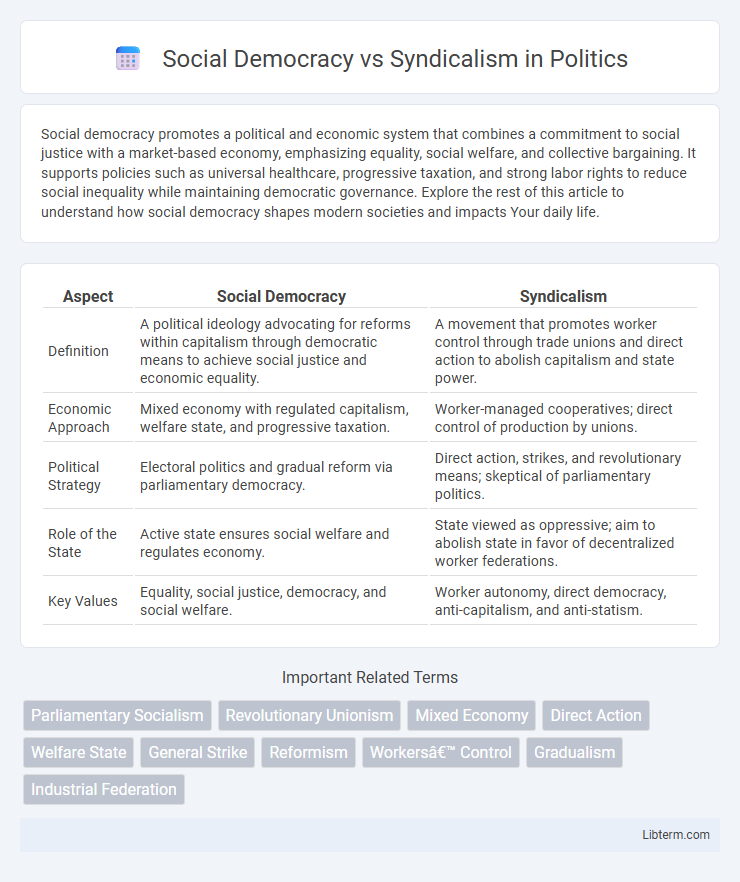Social democracy promotes a political and economic system that combines a commitment to social justice with a market-based economy, emphasizing equality, social welfare, and collective bargaining. It supports policies such as universal healthcare, progressive taxation, and strong labor rights to reduce social inequality while maintaining democratic governance. Explore the rest of this article to understand how social democracy shapes modern societies and impacts Your daily life.
Table of Comparison
| Aspect | Social Democracy | Syndicalism |
|---|---|---|
| Definition | A political ideology advocating for reforms within capitalism through democratic means to achieve social justice and economic equality. | A movement that promotes worker control through trade unions and direct action to abolish capitalism and state power. |
| Economic Approach | Mixed economy with regulated capitalism, welfare state, and progressive taxation. | Worker-managed cooperatives; direct control of production by unions. |
| Political Strategy | Electoral politics and gradual reform via parliamentary democracy. | Direct action, strikes, and revolutionary means; skeptical of parliamentary politics. |
| Role of the State | Active state ensures social welfare and regulates economy. | State viewed as oppressive; aim to abolish state in favor of decentralized worker federations. |
| Key Values | Equality, social justice, democracy, and social welfare. | Worker autonomy, direct democracy, anti-capitalism, and anti-statism. |
Understanding Social Democracy: Core Principles
Social Democracy emphasizes a balance between market capitalism and social justice, advocating for policies such as progressive taxation, social welfare programs, and regulated labor markets to reduce inequality. It supports democratic political systems where government intervention ensures basic rights, education, healthcare, and workers' protections without abolishing private enterprise. The core principle is achieving social equity through reformist and democratic means rather than revolutionary upheaval.
Syndicalism Explained: Foundations and Ideology
Syndicalism is a radical labor movement advocating for direct action by workers to seize control of the means of production through trade unions, emphasizing decentralized, worker-managed industries. Its foundational ideology prioritizes industrial unionism, direct democracy within worker organizations, and the abolition of the capitalist state in favor of a federated system of self-managed enterprises. Syndicalists reject parliamentary politics, promoting strikes, sabotage, and workplace insurrection as primary tools for achieving economic and social transformation.
Historical Origins of Social Democracy and Syndicalism
Social Democracy originated in the late 19th century as a political movement rooted in the Marxist tradition, aiming to achieve socialism through democratic means and reformist policies within parliamentary systems. Syndicalism emerged during the same period, particularly in France and Italy, emphasizing direct worker control and revolutionary industrial unionism to overthrow capitalism through general strikes and grassroots labor actions. Both ideologies arose in response to industrial capitalism but diverged significantly in their strategies for achieving social and economic justice.
Key Philosophical Differences Between Social Democracy and Syndicalism
Social democracy emphasizes reforming capitalism through democratic institutions and welfare state policies to achieve social justice, prioritizing gradual change and political participation. Syndicalism advocates for direct action by workers through trade unions to dismantle capitalism and establish a society managed by workers' councils, emphasizing revolutionary means over parliamentary reforms. These key philosophical differences highlight social democracy's commitment to state-mediated progress versus syndicalism's focus on worker self-management and direct economic control.
Economic Structures: Parliamentary Reform vs Direct Action
Social Democracy emphasizes economic structures based on parliamentary reform, advocating for gradual policy changes and welfare state mechanisms within a capitalist framework to achieve social justice. Syndicalism promotes direct action through workers' control, advocating for decentralized economic power via trade unions that manage production and bypass traditional political institutions. These contrasting approaches reflect divergent strategies for economic transformation: institutional negotiation versus grassroots worker-led organization.
Labor Relations: Trade Unions vs Workers’ Councils
Social Democracy emphasizes labor relations through trade unions that negotiate collective bargaining agreements within established political frameworks to secure workers' rights and improve workplace conditions. Syndicalism advocates for direct worker control via workers' councils, promoting decentralized, self-managed workplaces where labor decisions are made democratically by the workers themselves. Trade unions function within capitalist structures seeking reform, whereas workers' councils aim to dismantle hierarchical labor systems to empower workers directly.
Political Strategies: Electoral Participation vs Grassroots Mobilization
Social democracy emphasizes electoral participation by engaging in democratic institutions and seeking policy reforms through voting and party systems to enact gradual social change. Syndicalism prioritizes grassroots mobilization, organizing workers directly through unions and collective actions like strikes to challenge capitalist structures and promote worker control. These contrasting political strategies reflect social democracy's reliance on institutional mechanisms versus syndicalism's focus on direct action and decentralized organization.
Global Influences and Notable Case Studies
Social Democracy, rooted in gradual reform through parliamentary systems, significantly influenced Western European nations like Sweden and Germany, where mixed economies and welfare states emerged as global models. Syndicalism, emphasizing direct action and worker ownership, found notable expression in early 20th-century France and Spain, especially through the Confederacion Nacional del Trabajo (CNT) during the Spanish Civil War. Both ideologies have shaped labor movements worldwide, with Social Democracy promoting institutionalized labor rights and Syndicalism inspiring grassroots union activism.
Criticisms and Challenges Faced by Both Movements
Social democracy faces criticism for perceived compromises with capitalist structures, leading to accusations of diluting socialist ideals and fostering bureaucratic inefficiency. Syndicalism struggles with practical challenges such as achieving widespread worker solidarity and overcoming legal repression, limiting its effectiveness in large-scale industrial economies. Both movements grapple with balancing radical goals and pragmatic political engagement amid evolving economic and social landscapes.
Contemporary Relevance: Future of Leftist Movements
Social democracy emphasizes gradual reform within capitalist frameworks through welfare policies and democratic institutions, appealing to centrist voters in current leftist movements. Syndicalism advocates for direct worker control of production and radical restructuring through labor unions, resonating with grassroots activism and labor rights campaigns. The future of leftist movements likely involves a synthesis of social democratic policy pragmatism with syndicalist organizing strategies to address economic inequality and corporate power in the 21st century.
Social Democracy Infographic

 libterm.com
libterm.com